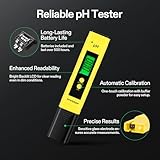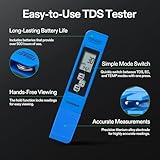 Advertising Disclosure
Advertising DisclosurePh Meter Comparison - October 2025

Our Top 3 Picks
Here are the top 3 recommended products with more information to help you find the right product for you9.7
1Apera InstrumentsApera Instruments AI311 Premium Series PH60 Waterproof pH Pocket Tester Kit, Replaceable Probe, ±0.01 pH Accuracy, Lcd display
9.9 worth the money9.6 clearly written9.3 Simple to useWhy we love it
Highly accurate with a 0.01 pH range.
Easy auto calibration and temperature compensation.
Comprehensive kit with all necessary accessories included.
9.4
2Apera Instruments25% OffAPERA INSTRUMENTS AI209 Value Series PH20 Waterproof pH Tester Kit, ±0.1 pH Accuracy
9.3 clearly written9.1 Simple to use9.1 worth the moneyWhy we love it
Highly accurate pH readings.
Quick and easy to use.
Long battery life.
9.2
3VIVOSUN26% OffVIVOSUN Digital pH and TDS Meter Kits, 0.01pH High Accuracy Pen Type pH Meter ± 2% Readout Accuracy 3-in-1 TDS EC Temperature Meter for Hydroponics, Pool and Aquarium, Yellow Blue, UL Certified
8.9 worth the money7.9 clearly written7.7 Simple to useWhy we love it
Affordable and effective solution.
User-friendly design and calibration.
Versatile for various applications.

Ph Meter Buyer's Guide
 Written by Libby Johnson
Written by Libby JohnsonIntroduction to PH Meters
A pH meter is a device used to measure the acidity or alkalinity of a solution. This is usually done by measuring the hydrogen ion concentration in the solution, which is expressed as pH. The pH meter allows you to accurately measure the pH of a solution and make adjustments to ensure the correct pH level. This is especially important in scientific and industrial applications, where the pH of a solution can have a direct effect on the accuracy of the results. PH meters are available in a variety of styles, including handheld, laboratory, and even portable units. Depending on the type of application, different types of pH meters may be more suitable for the job.
Types of PH Meters
There are several types of pH meters available, each designed for a specific purpose. For general laboratory use, a basic benchtop pH meter may be the best choice. These are typically the most accurate and provide the most features. For more specialized applications, such as measuring the pH level in a swimming pool or aquarium, a handheld or portable pH meter may be more suitable. These are usually less expensive and easier to use, but may not provide the same level of accuracy or features as a laboratory pH meter. For industrial use, an immersion probe pH meter may be the best choice. These are designed to be used in large containers or tanks, and can measure the pH levels in solutions that are too large or too hazardous to measure manually.
Features of PH Meters
The features of a pH meter can vary greatly depending on the type and model. Most pH meters will have basic features such as LCD display, temperature compensation, and automatic calibration. More advanced models may also have additional features such as data logging, multiple point calibration, and digital output. It is important to consider what features are necessary for the application before purchasing a pH meter.

Selecting a PH Meter
When selecting a pH meter, it is important to consider the type of application and the accuracy required. For general laboratory use, a basic benchtop pH meter may be the best choice. For more specialized applications, such as measuring the pH level in a swimming pool or aquarium, a handheld or portable pH meter may be more suitable. For industrial use, an immersion probe pH meter may be the best choice. It is also important to consider the features of the pH meter, such as LCD display, temperature compensation, and automatic calibration, to ensure that the pH meter is suitable for the application.
Cleaning and Maintenance of PH Meters
Cleaning and maintenance of pH meters is an important part of ensuring accurate and reliable results. It is important to follow the manufacturer’s instructions when cleaning and maintaining a pH meter. This may include cleaning the electrodes and other parts of the meter, and calibrating the meter regularly. It is also important to store the pH meter in a cool, dry place and to store it away from direct sunlight.
Conclusion
A pH meter is an essential tool for measuring the acidity or alkalinity of a solution. Different types of pH meters are available, depending on the application, and it is important to consider the type of application, accuracy required, and features of the pH meter when selecting one. Proper cleaning and maintenance of the pH meter is also important to ensure accurate and reliable results.

Our ranking system
At bestchoice.com, our team curates a selection of top products from a vast array available online, using a sophisticated ranking system based on carefully defined criteria.While traditional hands-on testing has its merits, our use of AI technology offers distinct advantages. AI allows us to process and analyze vast amounts of data from multiple sources, providing a comprehensive view that goes beyond what manual testing can achieve. This approach enables us to deliver insights that are aligned with current trends and consumer preferences, ensuring our reviews are both relevant and up-to-date.
Features
Our AI-driven analysis examines key attributes, capabilities, and other critical factors tailored to each product category. This method allows us to assess effectiveness from various perspectives, ensuring a well-rounded evaluation.
Consumer Reviews
We aggregate and evaluate consumer feedback from across the internet, giving weight to ratings and reviews that reflect the most reliable insights. AI enhances this process by filtering and prioritizing data, offering a balanced view without the need for direct personal endorsements.
Popularity
Our system also considers the popularity of products, analyzing factors such as market presence, reputation, and user satisfaction. By leveraging AI, we capture a comprehensive picture of a product's standing in the market, which may not always be evident through traditional testing.
Value for money
AI allows us to compare products based on attributes like price, specifications, and user feedback, helping to determine their value for money. This data-driven approach offers an efficient and reliable way to assess how products stack up against one another in terms of cost-effectiveness.

































